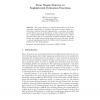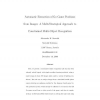140 search results - page 3 / 28 » A relation-algebraic approach to simple games |
CG
1998
Springer
13 years 9 months ago
1998
Springer
This paper discusses a practical framework for the semi automatic construction of evaluation functions for games. Based on a structured evaluation function representation, a proced...
CORR
2010
Springer
13 years 5 months ago
2010
Springer
Abstract. Two-player zero-sum games are a well-established model for synthesising controllers that optimise some performance criterion. In such games one player represents the cont...
CDC
2009
IEEE
13 years 10 months ago
2009
IEEE
— Since Witsenhausen put forward his remarkable counterexample in 1968, there have been many attempts to develop efficient methods for solving this non-convex functional optimiz...
AAI
2010
13 years 2 months ago
2010
Here, we present a constrained object recognition task that has been robustly solved largely with simple machine learning methods, using a small corpus of about 100 images taken u...
IPL
2006
13 years 5 months ago
2006
We present a Coq-formalised proof that all non-cooperative, sequential games have a Nash equilibrium point. Our proof methodology follows the style advocated by LCFstyle theorem p...


